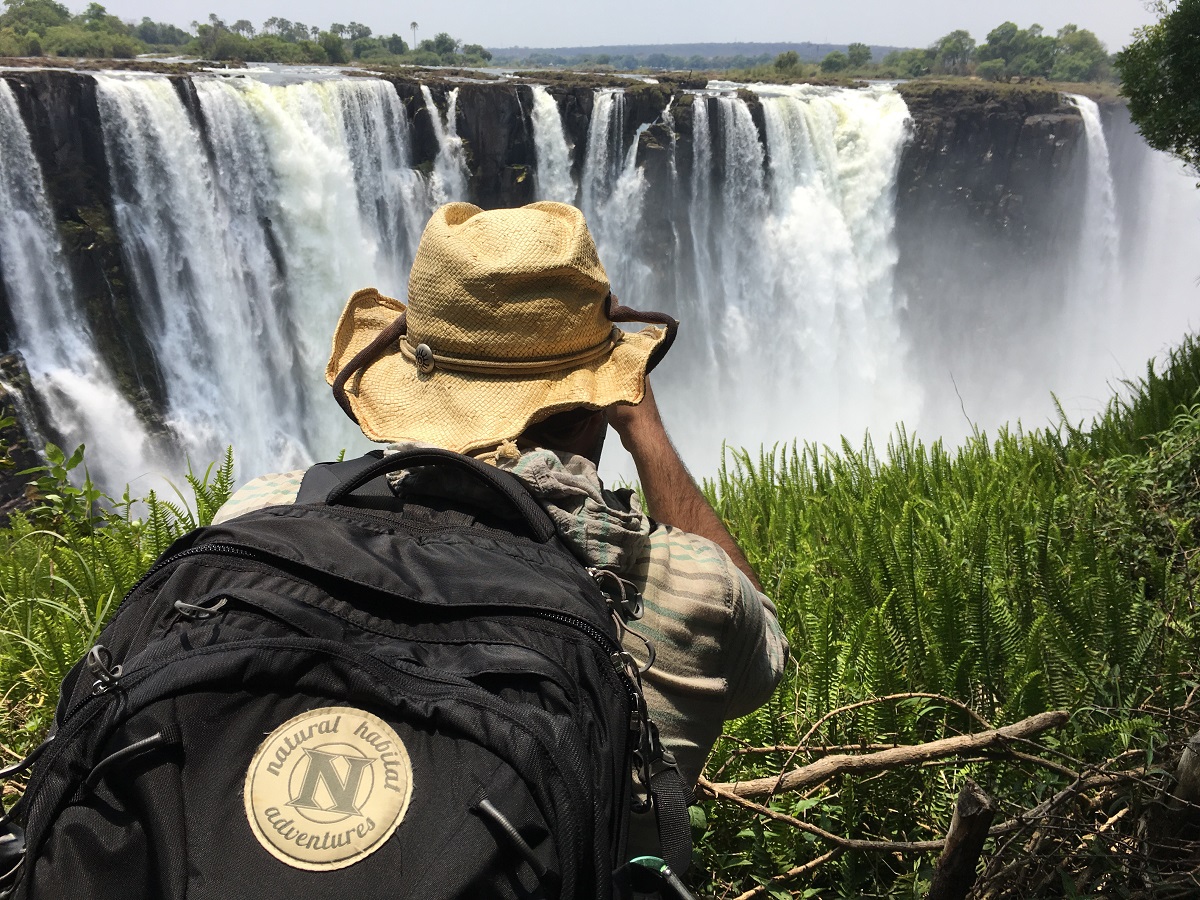Victoria Falls: The Eden of Africa
Scottish explorer David Livingstone first recorded Victoria Falls in 1855, writing that he was struck by “scenes so lovely they must have been gazed upon by angels in their flight.” Rising spray creates shimmering rainbows and sustains a lush rainforest microclimate along the basalt canyon walls. The thundering, iridescent water is one of Earth’s most powerful displays of natural beauty.
The Largest Curtain of Falling Water on Earth
Victoria Falls is the largest single sheet of falling water in the world, spanning 5,604 feet—more than a mile across—and plunging 354 feet into the gorge below. The Zambezi River reaches peak flow between February and March, when more than 150 million gallons per minute surge over the precipice. By November, during low water, the flow diminishes to about 2.6 million gallons per minute, and the river splits into braided channels that tumble in multiple distinct cascades. While Laos’ Chutes de Khone is wider and Venezuela’s Angel Falls is taller, Victoria Falls remains unmatched for its combined height, breadth, and volume.
UNESCO World Heritage Site & Natural Wonder
Recognized as a UNESCO World Heritage Site since 1989, Victoria Falls is also celebrated as one of the Seven Natural Wonders of the World, alongside the Great Barrier Reef, Aurora Borealis, Grand Canyon, Mount Everest, Harbor of Rio de Janeiro, and Parícutin volcano. The falls’ origins trace back two million years, when the Makgadikgadi Pan—one of the largest salt flats on Earth—uplifted, redirecting the Zambezi River over basalt rock. Over time, the river’s erosive force carved the narrow gorges seen today. Archaeological finds, including Early Stone Age tools, reveal human presence here stretching back hundreds of thousands of years.

© Francisco Di Poi
Halfway Along the Mighty Zambezi River
Victoria Falls sits roughly midway along the Zambezi River, which flows east to the Indian Ocean. On Nat Hab’s Secluded Botswana Safari, travelers take a guided walking tour along the rim, following a network of trails to panoramic viewpoints. Spanning the gorge is the historic Victoria Falls Bridge, completed in 1905 and, at the time, the tallest railway bridge in the world. Today, it remains a vital connection between Zimbabwe and Zambia.
The Devil’s Pool and Adventure Activities
During the dry season, visitors can swim in Devil’s Pool, a natural rock pool right at the edge of the falls. This daring experience is just one of many adventures available—others include bungee jumping from the Victoria Falls Bridge, scenic helicopter flights, and world-class white-water rafting. For a quieter experience, visit during a full moon to search for a rare “moonbow”—a lunar rainbow created by moonlight refracting through the mist.
Mosi-oa-Tunya: “The Smoke That Thunders”
The surrounding Mosi-oa-Tunya National Park—named for the clouds of spray visible from more than 12 miles away—is a haven for wildlife. It’s one of the best places to encounter white rhinos, and with no large predators present, Nat Hab guests can trek on foot with experienced guides and park rangers. This riverine ecosystem also supports elephants, giraffes, zebras, antelope, hippos, chacma baboons, warthogs, and notable birdlife, including African fish eagles and white-backed vultures.
Experience the power, history, and biodiversity of Victoria Falls on our Secluded Botswana Safari—an intimate journey to one of the planet’s most awe-inspiring natural wonders.
The post Traveling to Victoria Falls—5 Facts to Know Before You Go first appeared on Good Nature Travel Blog.